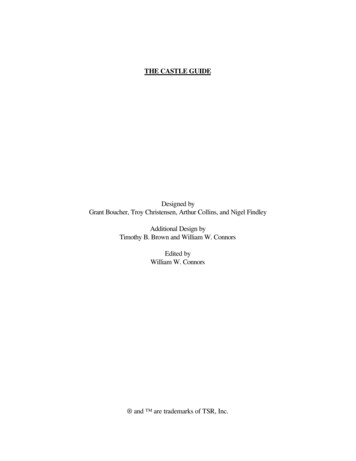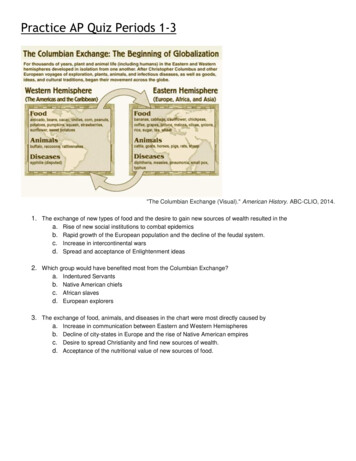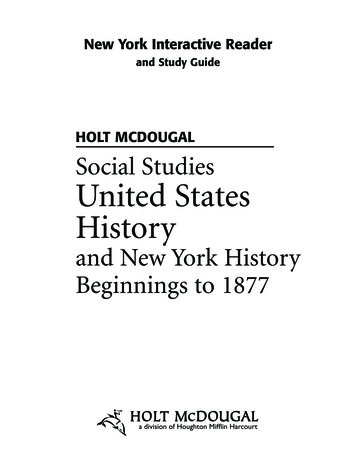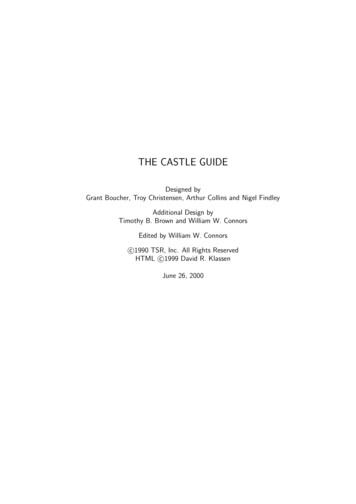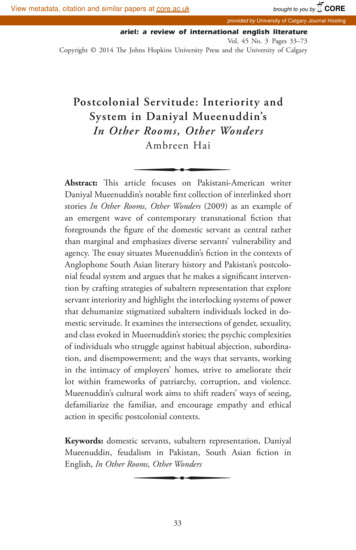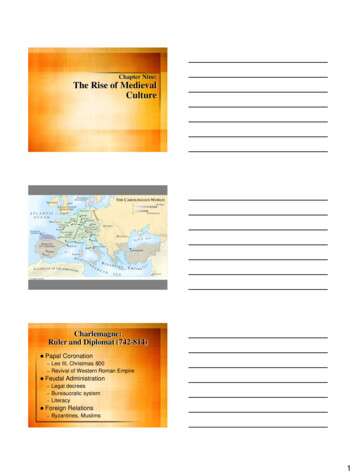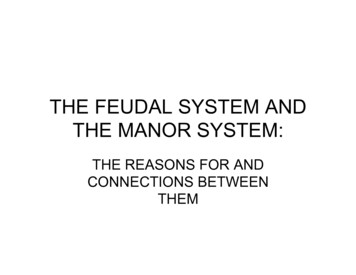
Transcription
THE FEUDAL SYSTEM ANDTHE MANOR SYSTEM:THE REASONS FOR ANDCONNECTIONS BETWEENTHEM
What are they?Feudalism:Feudalism is the socialorder that developedin Europe after the fallof the Roman Empireand existed until themid 1400ʼs.Manor System:The Manor System wasthe basic economicsystem that grew outof and supportedFeudalism.
Why Feudalism?After the Roman Empirefell, there was nostrong centralgovernment. With nostanding army orpolice, societies wereplunged into chaos.Feudalism providedsome structure tosociety and offeredprotection for themasses.
How did it work?In the 600ʼs, powerfulThere was no moneyFrankish (French)system, so land waschiefs owned largethe most valuableamounts of land.thing a chief couldHowever, theyoffer.needed an army toprotect it, and loyalThe Franks startedpeople to put it to use.giving land toimportant people inexchange for oaths ofloyalty to the chief.
How did it work?Over time, the Feudal system became moreformalized, and grew into a strict socialhierarchy. At the top were monarchs, andbelow them were nobles or lords. Nextcame the knights, and then, finally, theserfs or peasants.
The Feudal HierarchyMonarchNoble or LordKnightsSerfs
Feudal Hierarchy
MonarchA Monarch is another wordfor ʻKingʼ or ʻQueenʼ.Monarchs ʻownedʼ theland in their territory. Toraise an army, andensure that they couldcontrol the area, themonarch would grant fiefsof land to nobles.Pledge of Loyalty andserviceIn exchange for the land,the noble pledged loyaltyto the monarch andpromised to fight for thelord when called.A noble who pledge loyaltybecame a VASSEL of themonarch.
Noble or LordA noble is a person whoserves the monarch.They can be calledDukes, Barons, Earls,or whatever. Thenoble can use theland to establish amanor (more on thatlater).In exchange, the noblepromises to send acertain number ofarmed soldiers orknights when calledby the monarch. Theyalso pay taxes to themonarch.
KnightTo supply knights to the monarch,the noble would often dividehis fief of land among severalmen in exchange for theirpledge of loyalty to the noble.These men were calledknights.A knight was a highly skilledwarrior. He was trained fromage six in horsemanship andwarfare.Knights could also serve thenoble directly, getting supportand the right to live on thenobleʼs manor instead of land.A knight could also divide his ownland among other knights!
Peasants or SerfsPeasants are commoners and lived on the manors of monarchs,nobles, or knights. They were granted the right to farm a plot of landin exchange for working the nobleʼs land. Often, they worked fivedays on the nobles land and two on their own.Serfs were peasants who were ʻtiedʼ to the land. They could neverleave without the nobleʼs permission.In practice, most peasants lived and died without ever seeing beyondtwo miles of their front door.
Review Feudalism grew out of thechaos caused by the fallof the Roman Empire. It was based on thegranting of land inexchange for loyalty andmilitary service. It provided order andsome security in theabsence of a stablecentral government. Serfs could farm someland on a manor andreceived the protection ofthe noble in exchange fortheir labor.
Weaknesses of the Feudal System Nobles often challenged monarchs oreach other, leading to constant warfare. The strength of a monarch was only assecure as the loyalty of his nobles. Over time, fiefs became so small theycould not support a manor in some cases. These landless knights and noblescontributed to ever more warfare.
Manor SystemManor: The estate of a knight or noble on aʻfiefʼ of land. Each manor was designedin the same basic way.The management of the resources on themanor and its economy came to be knownas the ʻManor Systemʼ.
Goals of Manor System Each Manor tried tobe self-sufficient, orcreate all the foodand other materials itneeded. To be secure, amanor did not want torely on outsidesources of food andother essential items.
WHY SELF-SUFFICIENT? Warfare between knights, nobles, andmonarchs was always a threat. Youneeded to create what you needed tosurvive. In other words, you could not relyon your neighbor. Commerce and trade were greatlyreduced. Roads were poor or non-existent.Most manors were far from cities, where asmall amount of trade still existed.
Why Self-Sufficient? In short, you could not be sure when thenext shipment of food, weapons, or otheressentials were coming your way. Thus,you had to make it yourself, or perish. Arming soldiers and knights was extremelyexpensive. You needed to keep yourmanor as wealthy as possible. Sendingmoney to a merchant cut into your profits.
How Did A Manor Work? The Manor wasbased around aʻManor Houseʼ or acastle. The noble orknight lived here. Fields were dividedinto three sections:One for springplantings, one for fallplanting, and oneʻfallow fieldʼ.
How Did It Work?A ʻfallowʼ field was leftunplanted for one or moreseasons to keep the soilfrom wearing out. Thefields were rotated, sothat each was fallowevery 2 or 3 years. This iscalled ʻCrop Rotationʼ.Peasants were given smallstrips of land to farm afterworking the lordʼs fields.
How Did It Work?Every manor had a millto grind grain. Thenoble owned it, andall peasants had touse it, for a fee ofcourse (they trulyhated this rule).
How Did it Work?Manors that had a pondor lake were lucky.They could farm fishand eels to add totheir food supply.Animals (pigs, cows,goats) roamed freelyacross commonpasture and fallowland.
How Did It Work?Each manor had achurch, paid for bythe noble. A portion ofland was farmed topay for the service ofa priest.Only nobles could huntwild game in the fieldsand forests.
Duties on the Manor: Nobles Nobles provided protection to peasantsduring times of war. They would bebrought into the manor house or castle. The word of the noble was law. He actedas judge in disputes between peasants orknights on his land. Nobles had to build a church and pay for apriest to serve the spiritual needs of thepeople living on the manor.
Duties on the Manor: Nobles The noble had to manage his manoreffectively, because he had to buyweapons, armor, and horses for soldiers,and himself. These were incrediblyexpensive! Without the money for these things, hecould not fulfill his oath of loyalty to hismonarch.
Duties on the Manor: Peasants Peasants provided labor. They farmed,worked the mill, made tools, spun cloth,and everything else one could imagine. Peasants worked the nobles land for fivedays, in exchange for working a small plotof land for two days. Skilled peasants (such as blacksmiths whocould make tools or weapons) were muchbetter treated.
Duties on the Manor: Peasants Peasants typically lived in one-roomhouses with any livestock they owned.Yes, they were filthy. Peasants paid for the ʻprivilegeʼ to grindtheir grain at the nobleʼs mill.
Duties on the Manor: Women Noble women often ran manor, either after theirhusband died, or was off at war (which was alot!). Noble women oversaw the manor house, whichwas like running a small company. Peasant women farmed, made cloth, brewedbeer, made candles, prepared food, tannedleather, raised the children, and everything else.Only highly skilled trades such as blacksmithwere closed to them.
Duties on the Manor: Priest Each manor had a priest. He was requiredto say Mass, baptize infants, and performlast rights. Attending mass and receiving churchsacraments were seen as essential togetting into Heaven. Thus, priests weregiven a great deal of respect.
Duties on the Manor: Bailiff The Bailiff was not a peasant or serf, but afreeman. Not a noble or knight, but not aslow as a common peasant. The Bailiff oversaw and helped managethe manor. In other words, making surethe work was getting done.
How did the Manor System SupportFeudalism? It divided a monarchʼsland among loyal nobles Nobles would defend theland, as it was the mostvaluable thing a personcould own at the time. Manors provided theincome needed tosupport the knights andsoldiers demanded by themonarch. A monarch could notoversee all the landhimself. Granting fiefsmade sure it was put toproductive use. Thiswould allow for taxes tobe paid, and, of course,knights armed for war.
Commerce and trade were greatly reduced. Roads were poor or non-existent. Most manors were far from cities, where a small amount of trade still existed. . people living on the manor. Duties on the Manor: Nobles The noble had to manage his manor effectively, because he had to buy

